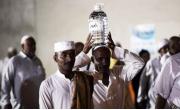 Jeddah, Oct 14: Pilgrims returning home after completing the Haj pilgrimage are becoming increasingly resentful of the five-liter cap on Zam Zam water imposed by the authorities.
Jeddah, Oct 14: Pilgrims returning home after completing the Haj pilgrimage are becoming increasingly resentful of the five-liter cap on Zam Zam water imposed by the authorities.
With the demand for the precious water surging as pilgrims return home, the authorities have moved to increase the supplies of Zam Zam in Jeddah and Madinah.While in Makkah, pilgrims have access to plentiful supplies of Zam Zam.
However, the long tradition of carrying Zam Zam water home following the Haj may well be on its way to becoming a memory as now almost all pilgrims are only allowed to carry a five-liter container with them which they are given at the check in counters at the airports. Moreover, this facility is limited to those pilgrims who have performed the Haj under government schemes.
However, individual pilgrims who came through private Haj operators are also allowed to take the same quantity of Zam Zam upon their return home.
Saeed Musfer Al-Wadi, director of the King Abdullah Project for Zam Zam of the National Water Company told Arab News: “Zam Zam water is being packed according to norms set by the civil aviation authorities in view of the carriage space in aircrafts.” He added that, “We are exclusively packing five-liter cans for returning pilgrims as advised by the civil aviation authorities.”
He said that the King Abdullah Project for Zam Zam produced over 78 million water bottles during the current Haj season.
Al-Wadi also said that, “We have prepared well in advance to serve pilgrims by raising our production and both production and packing is being done according to world standards of excellence.” He added that they had established ten selling points at the airports for the sale of five-liter cans of Zam Zam water.
While pilgrims welcomed the change, they were disappointed at the five-liter cap imposed on the volume of Zam Zam water.
“Every pilgrim wishes to take as much as Zam Zam as he can, but since authorities have ruled that they can only take a five-liter can, we have to abide by the ruling,” Indonesian Religious Minister Lukman Hakim Saifuddin told Arab News earlier.
Egyptian pilgrim Rashad Fahmi said: “We thank the authorities for gifting the Zam Zam water upon our return home, but a mere five-liter can is insufficient for my family let alone the numerous visitors and relatives who will come to welcome me after the Haj pilgrimage.” He added that this was the only unique gift he could present back home.
“Zam Zam is a significant part of our journey of a life time,” said Indian pilgrim Abdul Hameed, referring to the pilgrimage, “but a five-liter can is really disappointing,” he concluded.




Comments
Add new comment